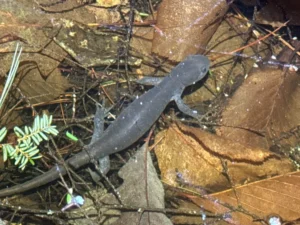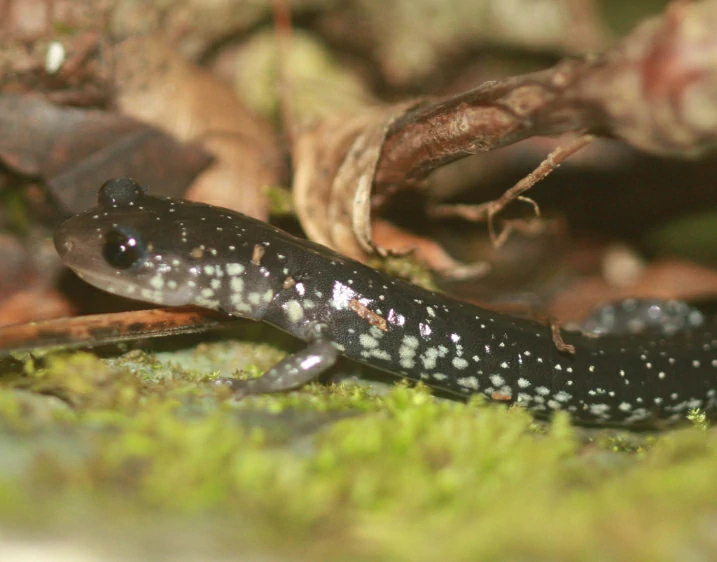When you walk through the woods at night or near a quiet pond, you might hear frogs calling, croaks, chirps, or peeps filling the air. These sounds are familiar in spring and summer, especially during breeding season. But salamanders live in many of the same places. So, you might wonder: do salamanders sing too?
Salamanders do not sing. They don’t croak, chirp, or call like frogs and toads. Most salamanders are completely silent. They don’t have vocal cords, and they don’t use sound to attract mates or communicate with each other. Instead, salamanders rely on body movements, scent, and touch to interact with the world around them.
Why Don’t Salamanders Make Noise?
Salamanders and frogs are both amphibians, but they have very different ways of communicating. Frogs and toads make calls using:
- Vocal cords
- Vocal sacs
- Air pushed through the throat and mouth

Salamanders, on the other hand, do not have vocal cords or vocal sacs. Their bodies simply aren’t built to make sounds. Most salamanders don’t even have the internal structures needed to produce noise.
This means no singing, no croaking, and no calling in the night.
Because of this, salamanders remain silent even during mating season or when defending their territory. Instead, their communication happens through other senses.
Are There Any Noisy Salamanders?
While salamanders don’t sing or croak like frogs, there have been rare reports of a few species making faint noises when stressed or handled roughly.
Some may let out a tiny squeak, a soft grunt, or a clicking sound in these situations.

But these noises aren’t common, and they aren’t used for talking to other salamanders. They are more like reflex sounds, quick reactions to danger or discomfort, rather than deliberate communication.
You won’t find salamanders gathering in noisy groups or forming “choruses” like frogs do.
How Do Salamanders Communicate Without Sound?
Even though salamanders are silent, they still find ways to communicate with each other. They use:
- Scent (pheromones): Many salamanders release chemicals from their skin or specialized glands. These scents send signals to others for attracting mates, marking territory, or warning rivals. This chemical communication is key during breeding season.
- Body language: During courtship, males often perform gentle nudges, wave or flick their tails, and do special dances to catch a female’s attention.
- Touch: Salamanders use physical contact like nose taps, rubbing tails, or head movements as part of their mating rituals.
This quiet, subtle communication fits their secretive lifestyle perfectly. Salamanders are shy, slow-moving creatures that rely on hiding and avoiding predators. Being silent helps them stay safe and unnoticed.
Why Is Silence Important for Salamanders?
Salamanders live in damp, quiet places (under leaves, rocks, or logs) often in low light or total darkness. Making noise would only draw attention to them.
Their skin is soft and delicate, making them vulnerable to predators. Staying silent helps them avoid being noticed.

Silence also helps salamanders hunt quietly. Their prey includes worms, insects, and small invertebrates, which are easily scared by noise.
Because salamanders don’t rely on sound for hunting or defense, quietness is a key part of their survival strategy.
How Do Salamanders Find Mates Without Singing?
Frogs call loudly to attract mates, but salamanders have a very different approach. During breeding season, males follow scent trails to locate females.
Once a male finds a female, he begins a slow, careful courtship dance. This might include:
- Waving or shaking his tail
- Rubbing noses or tails
- Walking in small circles or patterns
At the end of the dance, the male deposits a spermatophore (a small packet of sperm) that the female picks up to fertilize her eggs.
This whole process is quiet and deliberate. No singing or loud calls are involved.
What If You Hear Sounds Near Salamanders?
If you’re near a pond or forest and hear loud croaks, chirps, or trills, you’re almost certainly hearing frogs or toads, not salamanders.
These amphibians often share the same habitats and active seasons, especially in spring and early summer. Frogs can be very noisy at night, filling the air with calls.
Salamanders might be nearby, but you won’t hear them making any sounds.
Why Do People Think Salamanders Make Noise?
Because salamanders live alongside frogs and toads, it’s easy to assume they might also be noisy. Some people mistake soft clicking or squeaking noises salamanders make under stress as “singing.”
In truth, these are rare reflex sounds, not deliberate communication.
Salamanders’ silent nature can surprise people who expect amphibians to be noisy. But their quiet ways are just part of how they live.
Conclusion
So, do salamanders sing? No, hey are silent animals. They don’t have vocal cords and don’t make calls like frogs do.
Instead, salamanders communicate through scent, touch, and subtle body movements. Their quiet nature helps them stay hidden from predators and move unnoticed in their dark, damp homes.
Salamanders don’t fill the night with music, but their silent, secretive behavior is part of what makes them special.
Next time you hear frogs singing near a pond, remember: salamanders are there too, but you won’t hear them. You’ll have to look quietly and watch closely to spot these shy, silent creatures.
Hi, my name is Ezra Mushala, i have been interested animals all my life. I am the main author and editor here at snakeinformer.com.

